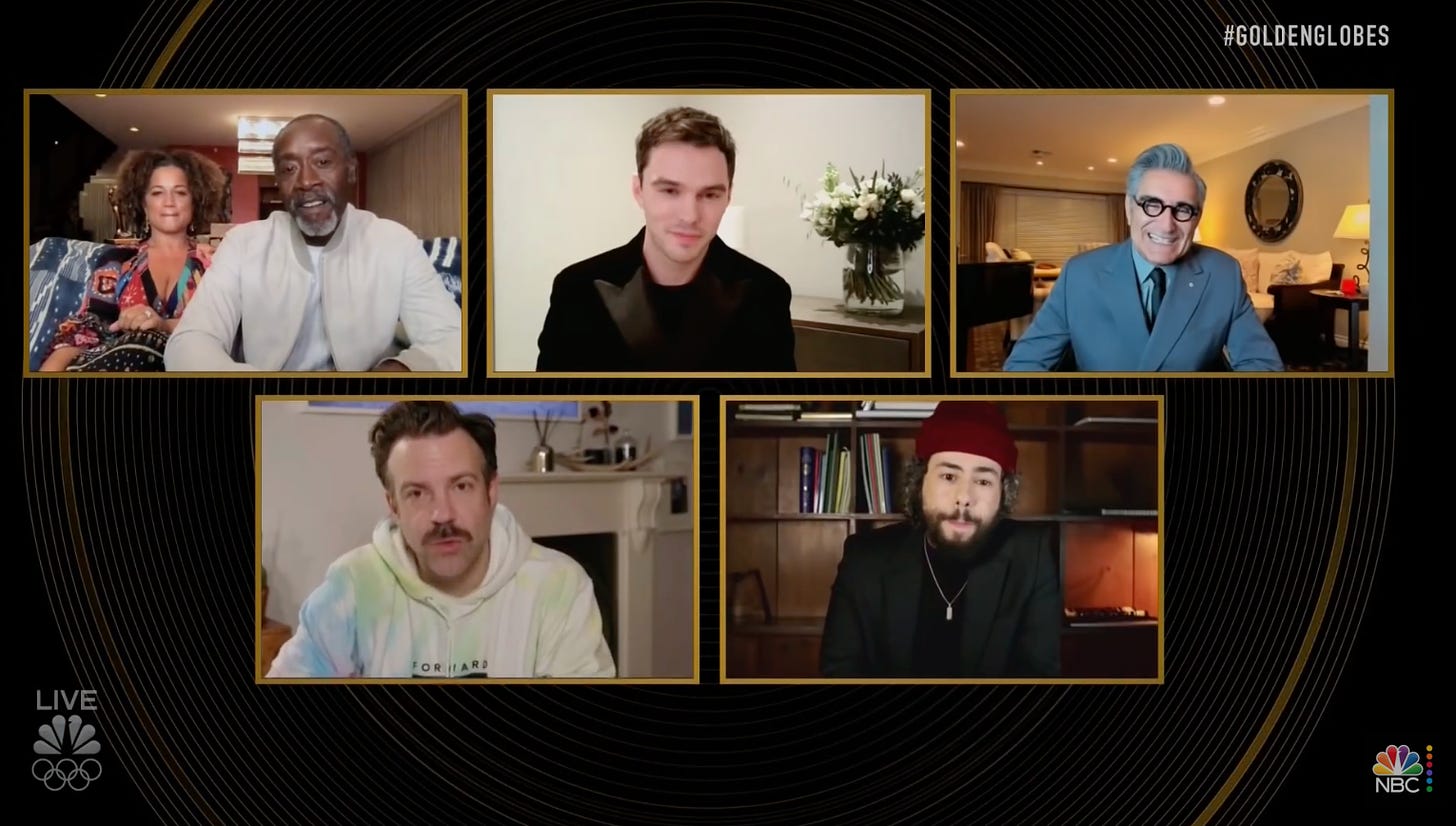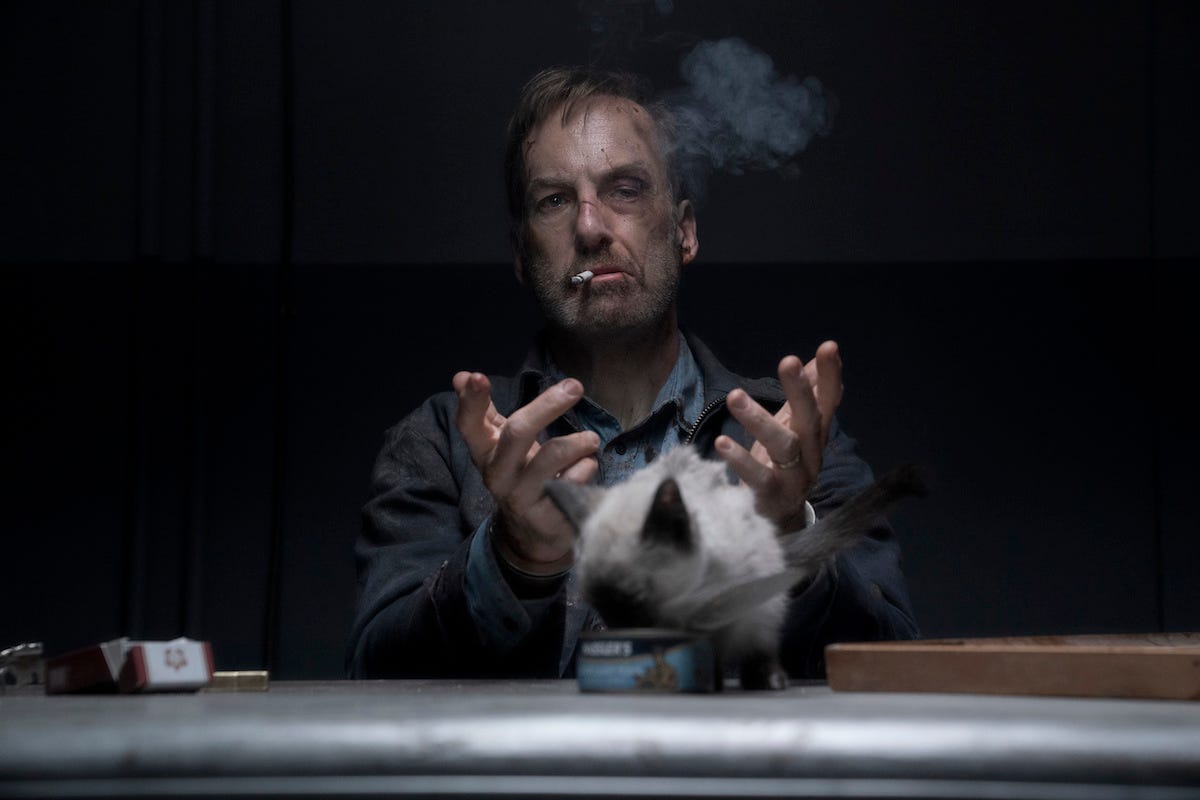Hollywood, Please Don't Zoom the Oscars
Plus: 'Nobody' reviewed! And a Godzilla movie assigned—but which one?
There are a number of things no one cares about thanks to the pandemic: watching sports; maintaining your weight; how badly our armpits stink. Add to that list “watching awards shows,” as no one seems terribly interested in seeing the rich and famous hand each other statuettes as we sit in our apartments, reeking of garlic and slowly expanding until our asses cover the entirety of our couches and we’re ready for our appearance on My 600-Lb. Life.
The Grammys were watched by just 8.8 million people this year, a drop of more than half compared to last year’s show. The Emmys hit an all-time low in September of last year, garnering just 6.1 million viewers and suffering a 25 percent drop in the coveted 18-49 demo (that is, viewers between the ages of 18 and 49). And the Golden Globes were, simply, a disaster: the Amy Poehler- and Tina Fey-led show did just one-third of last year’s ratings, nabbing a not-nice 6.9 million eyeballs.
The horrendous Globes numbers can be attributed to a couple of key factors. The first and most obvious is that this was a bad year for movies and a bad year for moviegoing. Virtually no one has seen flicks like Nomadland and Minari; no one cares about films like Mank and The Trial of the Chicago 7. This statement is completely divorced from the quality of these pictures (I liked Mank and Nomadland fine, even if they are minor triumphs as opposed to major landmarks); I’m merely relaying facts. Relegating movies to streaming services and PVOD diminishes them in a tangible way and we all care about them less as a result. We need movie theaters back, and quickly, if we’re going to get people to care about motion pictures again.
Allow me to suggest that the second reason no one cared about the Globes was because, as soon as you tuned in, you realized something was horribly amiss. I know I did. The fact that Tina and Amy were on separate stages on separate coasts was jarring. The realization that every star was Zooming into the show was dispiriting and distracting, calling to mind the endless work calls we endure from our Couch of Fatness every day. And the pre-recorded bits of videoconference comedy with movie stars and doctors made us all hope to catch a quick-acting case of COVID so we wouldn’t have to suffer through the rest of the show.
Simply put: watching awards shows where people teleconference in sucks. It sucks because it’s awkward and hard to produce. And it sucks because it reduces an evening of escapism and glamour to one more reminder that our world is fundamentally broken and won’t stop being broken until we’re all able to vaccinate and get back to living our lives.
All of which is to say that Oscar producers Steven Soderbergh, Jesse Collins, and Stacey Sher are absolutely, one-hundred-percent right to insist that there will be no Zoom acceptance speeches at the Oscars this year.
“For those of you unable to attend because of scheduling or continued uneasiness about traveling, we want you to know there will not be an option to Zoom in for the show. We are going to great lengths to provide a safe and ENJOYABLE evening for all of you in person, as well as for all the millions of film fans around the world, and we feel the virtual thing will diminish those efforts,” the trio wrote in a letter to nominees last week. The safety protocols will be equivalent to those on a major movie set, meaning lots of testing, lots of distancing, and lots of other measures designed to stop the spread of COVID.
Besides: Hollywood’s full of vaccine line-jumpers anyway. I’m sure they’ll be fine.
But the show won’t be fine if it allows people to participate via Zoom. It’ll be just another depressing reminder of the stupid age in which we live. So please, for the love of God, don’t back down on this one, producers. Hold the line! Demand that winners give in-person acceptance speeches—or none at all.
Snyder Cut week drew to a close on Thursday after my interview with Sean O’Connell, author of Release the Snyder Cut, for The Bulwark Goes to Hollywood. And what a week it was! Here’s the Across the Movie Aisle episode dedicated to the four-hour masterpiece; here’s my review in last week’s Screen Time. Here’s the Sub-Beacon episode! Here’s one last piece in the Washington Post suggesting that critics are largely happy to see Zack Snyder notch a win because he seems to be a pretty decent guy! If you want to help support these and other Snyder-tastic efforts, consider signing up for a membership at Bulwark+. You won’t regret it.
And now we sit and wait. For Army of the Dead, coming in May to Netflix!
Review: Nobody
When the trailers for Nobody dropped, some wags (including your humble narrator) took to calling the film by a different name. Being clever sorts, we noticed that Bob Odenkirk (best known as the comedian from Mr. Show who has in recent years honed his dramatic chops on AMC’s Better Call Saul) was playing a John Wick-style role as an everyman who was really good at killing folks and was doing so for a reason that exceeds our generally accepted scope of righteous violence (to recover his daughter’s kitty-cat bracelet). It was even written by the guy who wrote John Wick, Derek Kolstad.
Hence, Bob Wick was born.
The problem with Bob Wick is that there’s not enough Wick to the proceedings. It’s just a little too absurd, a little too silly. Say what you will about John Wick, but the man was deadly serious about his dead dog, and Keanu Reeves’s group of assassin friends, enemies, and frenemies were always pretty believable in their roles. In Nobody, meanwhile, I was a bit stumped when Christopher Lloyd, 82, started shuffling around a machining plant wielding multiple shotguns while a team of assassins stormed the premises.
Odenkirk plays Hutch Mansell, a standard sort, the man whose soul has been killed by suburbia. Hip-hop montages at the beginning run him through his week: going to work on Monday; missed trash collection on Tuesday; pull ups on a bus-stand on Fridays while staring at a real estate ad featuring his wife, Becca (Connie Nielsen). He and Becca sleep with pillows between them. The spreadsheets at work won’t fill themselves. It’s boring, it’s monotonous, it’s safe, it’s staid.
It’s life, man.
But that life gets shaken up after a home invasion. A pair of punks break into his house, look for stuff to steal, and stick a gun in his face. After letting them go despite having had the drop on one of the bad guys, he’s cursed for cowardice by his son Blake (Gage Munroe), and his daughter Abby (Paisley Cadorath) is distraught that the crooks got away with the aforementioned kitty-cat bracelet. So he sets off to right his wrongs, finds out that things are tough all over, decides to hop on a bus for a ride home, and, in the course of doing so, inadvertently sparks a war with the Russian mob.
That bus ride features the film’s best set piece: Hutch, who has shown hints of fury and inspired fleeting fear in a handful of folks, unloads his pent-up aggression on a quintet of Russian hangers-on. It’s a fantastic scene because it uses the geography and accoutrements of a bus—the narrow length of it; the foldable handicapped seats; the straps and poles on which commuters hang—for both comedic effect and to limit how the actual fight can play out. We see Hutch’s toughness and his improvisation, as well as his innate decency (he saves the female driver and a lone woman passenger!) and desire to be something more than a killing machine even as he accepts his purpose in life.
Everything up to and including this is quite good: we have a decent sense of Hutch and his life, and an idea of how this eruption of violence is going to shatter it. Everything after this—involving a Russian mob enforcer named Yulian Kuznetsov (Aleksey Serebrayakov) and his desire for revenge after Hutch’s metro-bound rampage leaves his brother on a ventilator—feels sketched out, rough, half-done. Shootouts are reduced to little more than gunplay montages, and Hutch’s aged father (Christopher Lloyd) and paunchy brother (Rza) show up at the end of the movie to save the day.
And this is where the Bob Wick joke founders a bit. While the world of John Wick felt lived-in and fully realized, what with its assassin guilds and hotel rules and codes and whatnot, Nobody feels a bit more rushed, a little haphazard. It almost goes out of its way to shatter the illusion: I’m sorry, I love Christopher Lloyd, but the image of him hobbling around while he tries to kill a bunch of hitmen is ludicrous, and not in a good, entertaining way. It looks silly, and it undermines the film because we’re already stretching to believe Odenkirk as a world-class killer.
To his credit, Odenkirk nails Hutch. He’s great, totally believable as a middle-aged killing machine. And at 90 minutes, Nobody doesn’t outstay its welcome. But I will admit to being modestly disappointed by the whole endeavor. It just feels a bit slapdash.
Assigned Viewing: Godzilla (HBO Max)
Since Godzilla vs. Kong is hitting theaters soon, it’s probably worth revisiting some of the previous movies in the series. The best, I suppose, is the first, Godzilla, which does this thing where you don’t really see Godzilla for most of the movie and then he shows up at the end in all his reptilian glory and wrecks some stuff. Good times!
The thing I love most about the movie, however, is the shot that serves as the image for this item. There’s something quite endearing about the fact that the filmmakers took a walking, fire-breathing symbol of nuclear arrogance—a Japanese warning against the horrors of Hiroshima and Nagasaki—and turned him into what amounts to an adjunct of the United States military. Just look at that picture! Godzilla is basically part of the American Navy. You love to see it!







